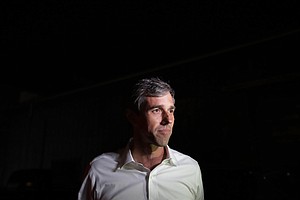3/18/2019

Analysis by Harry Enten, CNN
(CNN) -- Former US Rep. Beto O'Rourke's campaign is off to a fast start.
He reported raising $6.1 million in the first 24 hours of his campaign and has generated a lot of Google search interest.
Candidates who have done well on both metrics on launch day have seen a subsequent jump in the polls.
The Texas Democrat's fundraising haul is the best of any candidate announced so far. He beat Sen. Bernie Sanders' self-reported $5.9 million haul in the first 24 hours of his campaign. O'Rourke also toppled Kamala Harris' self-reported $1.5 million raised in her 24 hours. No other candidate has reported raising even a million dollars on their own first days.
Fundraising is important because it helps run campaigns. You need money to buy advertising and build a campaign infrastructure. That's especially the case when a primary field has many candidates in it and an extended primary season is more likely than normal.
Fundraising is also a manifestation of enthusiasm about a candidacy. When you raise a lot of money from a lot of people, it follows that a lot of people are interested in your candidacy. Indeed, that's been true so far this primary season.
According a study by FiveThirtyEight's Nathaniel Rakich, the two candidates who had seen large polling boosts following their announcements were Harris and Sanders. Both saw jumps in their primary support of greater than 5 points. No other candidate received a statistically significant polling boost.
Now, we obviously don't know if O'Rourke will receive the same polling bounce. Still, we know that O'Rourke has more potential support in the electorate than he is getting now. He was polling in the double-digits back in December following his unsuccessful bid to take down Sen. Ted Cruz in the 2018 Texas Senate race. O'Rourke is now only hitting about 5% to 6%. A polling boost would put him back to where he was polling previously.
Money isn't the only sign that O'Rourke is off to a fairly good start. We can examine how many people are searching for him on Google. You don't necessarily search for a candidate because you want vote for her or him. The two, though, are almost certainly correlated.
Indeed, so far this Democratic cycle, Google searches on launch day have been predictive of polling bumps. Because it isn't always clear whether people are searching for a candidate or someone else when said candidate can go by one name (e.g. "Beto" for Beto O'Rourke or "Bernie" for Bernie Sanders), we cannot say precisely which candidate received the most Google searches on launch day. We can, however, have a pretty good estimate of which candidates have had people searching for them.
O'Rourke's Google searches on launch day were on the same level as Harris and Sanders. They clearly had more Google search traffic than candidates such as Sens. Cory Booker and Elizabeth Warren.
In other words, O'Rourke's early Google search traffic looks like the candidates who saw polling jumps.
It shouldn't be too surprising that candidates who received a lot of money from early fundraising also had people searching for their names on Google. In the era of the small dollar donor, one of the fastest ways to figure out how to donate money to a candidate is to search for her or his name on Google.
Of course, even if O'Rourke gets a bump in the polls, the question is whether he can keep it up. One way he can likely help himself is by keeping his name in the news. We know one of the reasons Trump did well in the 2016 Republican primary was his ability to command media attention.
When it comes to being a magnet to news programs, O'Rourke seems to be following the path of Harris and Sanders. Harris kept her name in the news by announcing her candidacy on Martin Luther King Jr. Day and then waiting to do a formal laun
